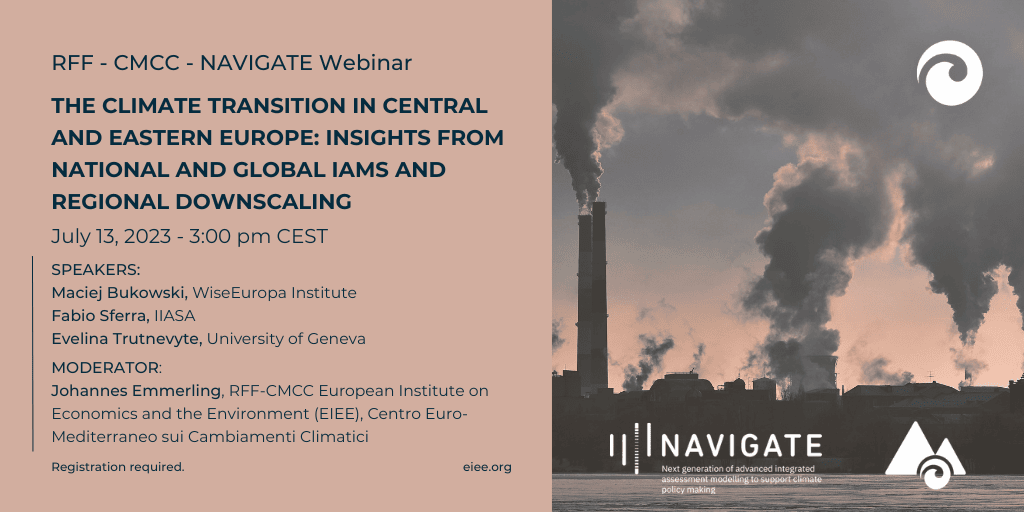RFF – CMCC – NAVIGATE Webinar
13 July 2023 – h 3:00 pm CEST
To participate to the webinar, register here

Moderator:
Johannes Emmerling, RFF‐CMCC European Institute on Economics and the Environment (EIEE), Italy
Speakers:
Maciej Bukowski, WiseEuropa Institute, Poland
Fabio Sferra, International Institute for Applied Systems Analysis (IIASA), Austria
Evelina Trutnevyte, University of Geneva, Switzerland
Agenda:
- Introduction by Johannes Emmerling
- Downscaling regional IAMs results to the country level – a new algorithm
Speakers: Maciej Bukowski, WiseEuropa Institute, Poland; Fabio Sferra, International Institute for Applied Systems Analysis (IIASA), Austria
Abstract: The IPCC AR6 states that under current NDCs (nationally determined contributions) global warming will likely exceed 1.5C during this century. Applying insights from this report on how to decarbonize national economies, has remained difficult as Integrated Assessment Models (IAMs) focus on a global scale or large economic aggregates, while emissions targets are nationally determined. This paper presents a new tool aiming at downscaling regional IAMs results to the country level, to provide guidance on how to enhance NDCs and mid-century strategies in line with the long-term goal of the Paris Agreement, based on best available science. We apply this tool to the latest NGFS 2022 results and show a range of pathways at the country level compatible with the 1.5C target. - Low-carbon electricity sector in Europe risks sustaining regional inequalities in benefits and vulnerabilities
Speaker: Evelina Trutnevyte, University of Geneva, Switzerland
Abstract: Using spatially-explicit electricity sector modeling for 296 sub-national regions in Europe, we show that emission cuts consistent with net-zero greenhouse gas emissions in 2050 result in continent-wide benefits by 2035 regarding electricity sector investments, employment gains, and decreased greenhouse gas and particulate matter emissions. However, benefits risk being concentrated in affluent regions of Northern Europe, while regions of Southern and Southeastern Europe risk high vulnerabilities due to higher adverse impacts and lower adaptive capacities.
WATCH THE VIDEO
HOW TO PARTICIPATE
13 July 2023 – h 3:00 pm CEST
To participate to the webinar, register here
ORGANIZED BY:
NAVIGATE – Next generation of AdVanced InteGrated Assessment modelling to support climaTE policy making

